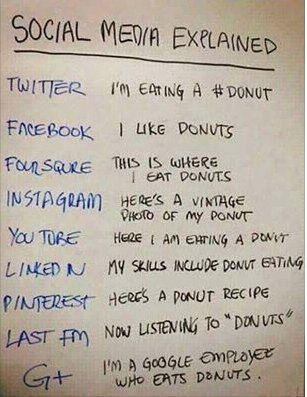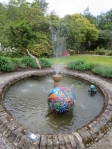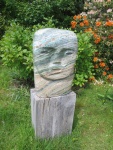I’ve been blogging for over a year now, and enjoying Facebook for longer; so I thought I’d offer some personal reflections on the various forms of digital communication and social media.
First, an admission: I am not, and have never been, much of a telephone person. I don’t like ‘phoning people, because it seems rude to interrupt what they’re doing just because I want to grab their attention; and although I always love to hear from my nearest and dearest family or my best friends, other ‘phone calls can be irritating if I’m concentrating on work or enjoying leisure. Also, we depend on so many cues when we talk to people face to face. We see whether they are smiling or looking fierce, we detect love or coldness in their eyes, we notice if they are giving us their full attention or tapping away at a computer at the same time. All these cues are, of course, absent when our only contact is audial. I like to be able to put out my hand and touch the person I’m talking to, if the mood takes me.

Mobile ‘phones, of course, compound my reticence. I do possess a mobile ‘phone (or a handy, as a German friend calls it), and occasionally I turn it on; but most people find me unsocially unavailable most of the time. Those who were present at my reading at the Poetry Society AGM last Autumn may recognise this photo.
Even worse than calling someone on a mobile ‘phone is texting. I deeply dislike predictive text, and find myself challenged to the point of exasperation by trying to find the correct keys to give me the punctuation I want. I am also saddened to see young people unable to lift their eyes from their mobile ‘phones, even when stepping out into busy roads or meeting socially.
Fortunately it is possible to send text messages by Skype, using a normal computer keyboard, so I do occasionally send a text to someone’s mobile by this method. Speaking of Skype, I am more than happy with this wonderful mode of communication. It gets round several of the difficulties that result from the lack of cues mentioned above, and it has absolutely transformed the accessibility and relationships of people separated by distance.
I can remember my first astonishing experience of faxing. I was in the IT department at the university when I needed to sign a contract with one of my publishers. I had a conversation with them on the telephone, then watched in amazement as the contract was spewed out of the fax machine before my eyes. It really did seem like magic in those days before all the wonders of digital communication made us blasé. But faxes, of course, had a restricted life, as new technologies tumbled over each other, challenging us to keep abreast of the developments.

I took to email like a duck to water. This was so much more satisfactory than telephoning without knowing how convenient one’s call was likely to be to the recipient. It was like leaving a message in their pigeon-hole at work, and trusting that they would deal with it when it suited them. Strangely, I think I had one of the first emails in the country: I was editing a journal at the time, and immediately saw the potential for publishing the articles I received, without having to re-type everything. I’ve still got that original email address, though I use some others as well, for different purposes.
In the nineties I was travelling all over the world on business, and wanted to keep in touch with my elderly mother. I therefore acquired a second-hand computer for her and set about teaching her how to use email. She must have been one of the first grey-surfers in the country, and as it was all so new and different from other forms of communication, it was quite a challenge to get to grips with it. I remember her bafflement when she finally succeeded in sending a message, and then found that it was still on her computer – ‘so it couldn’t have gone!’ I was very proud of her internet prowess, and wished there were more websites for her to visit. She would have thoroughly enjoyed the infinite possibilities for surfing that we now enjoy.
Turning to more recent social media, I have to admit that with some of them I am as much at sea as my mother was with her early incursions into emails. The two that for some reason leave me completely cold are Linked in and Twitter.

All sorts of people invite me to be Linked in with them, and quite often, rather than offend them, I comply. That tends to mean that I am connected to all sorts of people on Linked in, whom I don’t know and am never likely to meet. This network seems to pride itself on offering some sort of business advantage, but I think there are better ways to share business ideas and contacts.

But even worse than Linked in is Twitter. In a rash moment I accepted an invitation to join Twitter, and I know that millions of people swear by it. I am assured that it is an essential publicity tool for a writer; but I have to admit that, even after several exploratory incursions into the Twitter-realm, I still don’t get it. Apart from the fact that so many of the tweets appear to be completely inane, there is the huge practical problem of superfluity. Apparently the idea is to have as many Twitter contacts as possible, but that means
a) that there will be a constant and unstoppable stream of tweets arriving into one’s system and I certainly haven’t got time to read them all, and
b) no one is going to have time or inclination to read what I tweet either.
I’m sure that my sparse visits to Twitter (maybe once or twice a month) do not constitute the correct way to treat this miracle of mass communication; but the only way to see even a fraction of the tweets that are posted would be to leave it on all the time, which would mean one was constantly interrupted and would never get a decent day’s work done.

Next up the hierarchy of digital communication is Facebook, and here we come to a form of social media that, once I’d got the hang of it, I found I really rather enjoyed. It is an easy and enjoyable way of staying in touch with friends and family; but it has also turned out that many of my Facebook friends are poets, and through Facebook we inform each other of publications and publishing possibilities and share some of our work. I enjoy some of the humour that is shared on Facebook, and also turn to it to keep me abreast of the news, particularly the news that isn’t considered important by the mass communications industry. The groups within Facebook are useful for selecting who one wants to share material with, as not everything that is posted is of interest to everyone.
Sometimes people send or accept friending invitations and then are never seen on the site again. I can’t help wondering what happens to them. Is it that they read the posts but are too shy to share anything of their own lives, or do they join and then think better of it and abstain from these jolly gatherings in the market place?
Possibly the most enjoyable of these media is Blogging, because while Facebook allows posts of more substance and interest than Twitter, a blog can be quite an extended communication. Because the blogs are longer than the quick messages that characterise the other media, it’s not possible, or advisable, to follow too many. I’ve just looked to see whose blogs I follow most assiduously, and find that they are all, like myself, writers. I suppose that’s why I find them interesting. They include Anthony Wilson, Jo Bell, Kathleen Jones and Elizabeth Stott.
These reflections are, of course, entirely personal, and I mean no disrespect to those who, for instance, enjoy Twitter or use Linked in for their business interactions. And then, most of you will probably agree that at the end of the day the best social interaction is to meet someone for a walk or a drink and talk face to face.
 Delamore House is on the edge of Dartmoor, and is of special interest to us because it used to be owned by the same family as lived in the house that now contains our apartment. Although it is considerably grander (our house was the family’s ‘summer house’), there were similarities and common features, including a tholos, or cromlech.
Delamore House is on the edge of Dartmoor, and is of special interest to us because it used to be owned by the same family as lived in the house that now contains our apartment. Although it is considerably grander (our house was the family’s ‘summer house’), there were similarities and common features, including a tholos, or cromlech. 



 Sinead led a very good workshop the next morning. The event sparkled from start to finish, both because of Sinead’s stimulating input on abstract and concrete writing, and also because the fifteen participants all had intelligent, sensitive and lucid contributions to make.
Sinead led a very good workshop the next morning. The event sparkled from start to finish, both because of Sinead’s stimulating input on abstract and concrete writing, and also because the fifteen participants all had intelligent, sensitive and lucid contributions to make. This was followed by readings by Matthew Francis and Anthony Wilson, which I very much enjoyed. I knew both of these poets a little, but had not heard them read before; so it was a great pleasure. Unfortunately I had to leave after this, as I had another appointment the next morning. I therefore missed a number of other treats. If the programme is anything like as good next year, I recommend that poetry-lovers make the journey to this corner of England, as Bodmin Moor is a festival that is well-worth attending. I shall have to hope that I get another invitation!
This was followed by readings by Matthew Francis and Anthony Wilson, which I very much enjoyed. I knew both of these poets a little, but had not heard them read before; so it was a great pleasure. Unfortunately I had to leave after this, as I had another appointment the next morning. I therefore missed a number of other treats. If the programme is anything like as good next year, I recommend that poetry-lovers make the journey to this corner of England, as Bodmin Moor is a festival that is well-worth attending. I shall have to hope that I get another invitation! for the time of year, we were relieved to discover that the poetry festival actually takes place in adjacent buildings, complete with walls and roof.
for the time of year, we were relieved to discover that the poetry festival actually takes place in adjacent buildings, complete with walls and roof.




